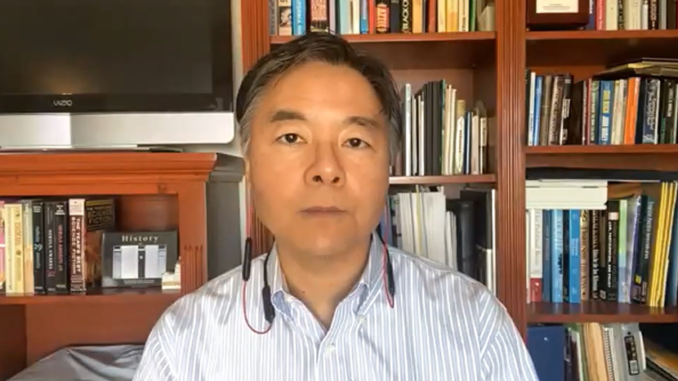
By Tex Yamada —
Congressman Ted Lieu, from California District #33, joined our club’s second virtual meeting via Zoom and highlighted the efforts of the 116th Congress (2019-2021) in passing legislation to combat the COVID-19 health and economic crises.
Congressman Lieu announced in sequence the five main legislative actions taken by Congress beginning in March through mid-May:
- $8.3 billion emergency funding bill signed into law March 6 (H.R. 6074)
- The Families First Coronavirus Response Act worth $104 billion and enacted into law March 18 (H.R. 6201)
- The Coronavirus Aid, Relief, and Economic Security (CARES) Act, totaling $2.2 trillion in financial aid (H.R. 748) and signed into law March 27
- The Paycheck Protection Program (PPP) valued at $484 billion and enacted into law April 24 (H.R. 266)
- The Health and Economic Recovery Omnibus Emergency Solutions (HEROES) Act, a blockbuster legislative bill targeting multiple public/private sectors and totaling more than $3 trillion passed by the House of Representatives May 15, and sent to the Senate for review and vote (H.R. 6800). The bill includes provisions for COVID-19-related financial aid, including $25 billion to help the U.S. Postal Service and $3.6 billion to expand vote by mail for the General Election in November.
Congressman Lieu also stated the procedures necessary to combat the spread of the coronavirus – “test, trace, and isolate” – Testing is considered important because it leads to quick identification of positive cases, to follow-up treatment of infected patients, and subsequent isolation to prevent further virus spread. Contact tracing is considered key in the identification of additional infected patients and controlling a virus outbreak. Likewise, isolation is critical in suppression of the disease spread.
“We in Congress have put in a lot of resources for testing and tracing. What we need is the Executive branch to execute,” pointed out Congressman Lieu. “Unfortunately, the Trump Administration has not been very competent. So, every day we try to push on them to do better.”
At the end of Congressman Lieu’s brief overview of House legislative actions and COVID-19, he answered questions from club members that were sent prior to the virtual meeting and during the meeting via Zoom/Chat. Moderator/2nd Vice President Ann Nye and Parliamentarian Carol Moeller screened questions for the Q & A session. Some of the questions and answers are paraphrased below.
Q: The HEROES Act has been reported in various media outlets as being “dead on arrival”, in its original form, as it progresses from the lower chamber of the House to the Senate. Do you think it will pass?
Lieu: We are trying to get additional bipartisan support and I think there are a number of Republican Governors who are now pushing on Republican Senators to support the HEROES Act. I do think as days and weeks go by, there’s going to be more and more pressure on the Senate to act.
Q: It appears that the state, county and city will all cut spending in ways that will reduce employment and degrade infrastructure. These austerity measures will likely result in a downward economic spiral that will rival the decade plus long Great Depression. What, specifically, do you propose to do to counter the doom that may await us?
Lieu: That’s the reason why the House passed the HEROES Act. It is money in the pockets of American workers. It is money going out to help the economy stabilize. Hopefully the Senate will pass that. It would make the economy better if this were to pass. So, we will see what happens.
Q: How can we ensure that COVID-19 relief bills are not handouts to the fossil fuel industry and instead promote just transition to clean energy and support workers over big corporations?
Lieu: We’ll see what happens when we negotiate with the Senate, but as currently structured, it [HEROES Act] is pretty good in terms of how it distributes the funds. We are also working separately on an infrastructure bill…and then when we start to recover, we have to have a large infrastructure package. In that package, we have to focus on Green technology and Green Energy and transition to renewable energy instead of fossil fuels.
Q: How will the recent legislation in excess of $3 trillion specifically aid local cities and the State, which are now facing financial shortfalls in the current fiscal year budgets?
Lieu: The HEROES Act provides $500 billion to the States, $375 billion to local cities, and $90 billion to K through 12 school districts. So, for example, Redondo Beach, if this bill passes without any changes, would get approximately $20 million, split between this year and next year.
Q: Are Trump properties benefiting from stimulus bills? Is there any way we could ever see the recipients of Trump’s handouts from this fund?
Lieu: The House has created a Coronavirus Subcommittee specifically to oversee and conduct oversight on how the Executive branch is spending Coronavirus funds. Also, in the CARES Act, we did put in an oversight provision. However, on signing the bill, the President said he was not going to comply – inferring that the matter is destined for litigation to determine the constitutionality of the President’s intention not to comply.
Q: Will Congress include the US Postal Service in the next relief bill? Can we strengthen it by adding additional services such as a post office bank? Can this institution get the emergency funding it needs in time to be saved?
Lieu: There is money in the HEROES Act to help stabilize the U.S. Post Office. And by the way, I have no idea why Donald Trump is going after the Post Office. It seems like an insane strategy for the Election. If UPS or FedEx had to deliver an envelope for 55 cents to anywhere in America, they would go bankrupt. So, the Post Office is on a very different mission and most members of Congress understand that.
Q: What worries you the most about election security, Russian manipulation, and prospects for voting in November?
Lieu: There are two main types of election interference, or election influence. One is straight-up hacking, which involves physical tampering of voting machines or voter data bases. Although straight-up hacking is possible, it is an unlikely occurrence because the hacker does not have time nor accessibility to carry out the misdeed in a present-day national election. But, the more problematic interference is influence hacking or psychological operations (psy ops) for short, which Russia and other foreign governments engage in. In short, influence hacking is posting messages to sway public opinion, using secretive means. Troll farms are used to source messaging or influence hacking. In 2016, a lot of Americans were thinking they were reading posts from their neighborhood, when in fact, it was someone from the Kremlin. Now the good news is that the American public now trusts social media much less, which is helpful. So now, when they see a post on Facebook or Twitter, they might not immediately assume it is true. They might assume, okay, maybe it is not true, or maybe it’s a Russian troll.
Q: What Senate and House elections do you think are the most important to support to ensure a Democratic House and Senate majority?
Lieu: In the California House of Representative races, the same seven seats that were flipped from red to blue in 2018 are up for grabs again. All seven candidates, including Josh Harder, TJ Cox, Gil Cisneros, Mike Levin, Katie Porter, Harley Rouda, and Christy Smith are involved in close races. In the U.S. Senate, there are six races, which will determine what Party gains control of the upper chamber and we have a much better map than we did last term. Right now, we are ahead in Arizona, Maine, and Colorado, and we’re essentially tied in North Carolina. We’re slightly ahead in Montana. And then we’ve got to hold Doug Jones’ seat in Alabama. These are the states I would focus on.
Q: What can the Democratic Party grassroots do to ensure Biden is elected in November?
Lieu: I would focus on the swing states of Pennsylvania, Michigan, Wisconsin, Arizona, Florida, and North Carolina. Hypothetically thinking, if Joe Biden wins Michigan, Wisconsin, and Pennsylvania, it’s nearly impossible for Donald Trump to win. He would have to essentially take a Blue State and flip it. In another hypothetical situation, if Biden were to win Michigan, Pennsylvania, and either Florida or Arizona, that combination of victories would almost ensure a Biden victory. So, I would focus on those swing states, and I think that is Biden’s clearest path to election in November.

Leave a Reply